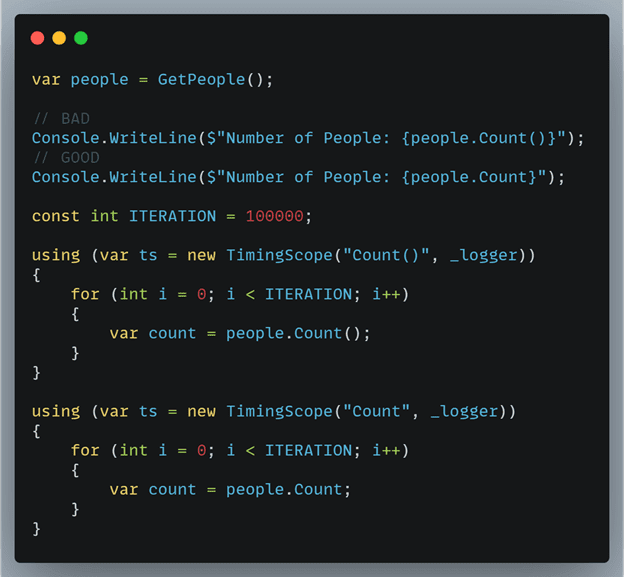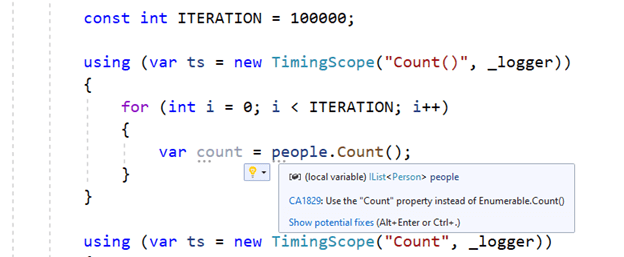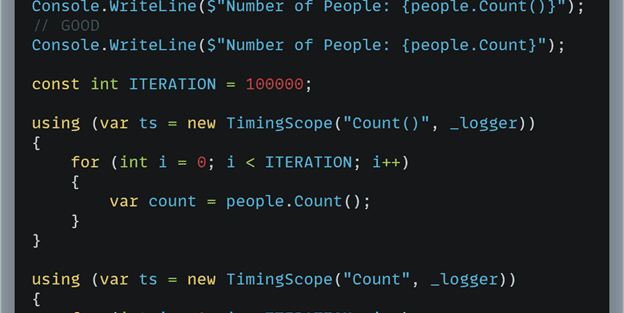A measure of how good you are as a developer is how well you can write code. This is a start of a series of posts to help developers write better code. Today we will look at Count vs. Count() in .NET.
Count
There are many collections in .NET that support a property called Count. This includes List, List<T>, HashSet<T>, and many more. The Count property is a value the represents the number of elements in the collection.
Here is the documentation for the List<T>.Count property.
List<T>.Count Property (System.Collections.Generic) | Microsoft Docs
Count()
.NET supports two interfaces, IEnumerable and IEnumerable<T>, which provide the ability to iterate over a collection. Along with these interfaces are a set of static extension methods defined in Enumerable which add functionality for querying a collection of objects based on LINQ. One of those methods is Count() which iterates over the collection to determine the number of items in the collection.
Here is the documentation for the IEnumerable interface and Enumerable.Count method.
IEnumerable Interface (System.Collections) | Microsoft Docs
IEnumerable<T> Interface (System.Collections.Generic) | Microsoft Docs
Enumerable.Count Method (System.Linq) | Microsoft Docs
Comparison
So why do we care about the difference between Count and Count()? One simply reads a value in memory to determine the count of the elements in a collection and the other iterates over the entire collection in memory to determine the count of the number of items.
There is a big performance difference when it comes to these two approaches. What is worse is that the performance difference gets worse when the size of the collection grows. These might now seem like a big deal, but it does add up over time. If you have a large code base or high scale application, you will begin to see the impact over time.
Here is an example of code that gets a collection of people using List<Person>. We then use Count and Count() to get the number of people in the collection.

We measure the performance difference between the two approaches. One can see that Count() extension method takes 7 times longer than using the Count property. This gets worse when the number of items in the collection increases.

If you don’t believe that this is a quality issue, check out the code analysis tip in Visual Studio by hovering over the Count() method. There you will see code analysis rule CA1829.

The description of rule CA1829 provides a clear reason as to why not to use the Count() method.
“The Count LINQ method was used on a type that supports an equivalent, more efficient Length or Count property.”
Here is the documentation for the Code Analysis Performance Rule CA1829.
Anecdote
I remember being one of a four architects on Fidelity’s Active Trader Pro. This is amazing product developed by 80 to 90 awesome developers. Count vs. Count() was one of the performance problems we would find in our code reviews. An even bigger challenge was the overuse of LINQ queries in a fluent style programming syntax. Finding bad LINQ queries was a large part of our performance optimization during the project. This leads me to one of my favorite things to tell developers, “LINQ is convenient not performant”. Interestingly, I am on a project at the moment where we are addressing quality issues such as Count vs. Count().
Conclusion
It is our hope that you have learned the proper the use of Count vs. Count() and that this is the beginning of your journey to improve the quality of the code that you write.
Appreciation
Thanks to our friends at MILL5 for sponsoring this article.
Author(s):
Richard Crane, Founder/CTO
Disclaimer:
All source code is licensed under the Apache 2.0 license.
References:
Count vs. Count() Code Example
https://github.com/MILL5/quality/tree/main/fundamentals/Count
*** The article came from Richard Crane, Founder/CTO, MILL5 (wickedprogrammer.com).



